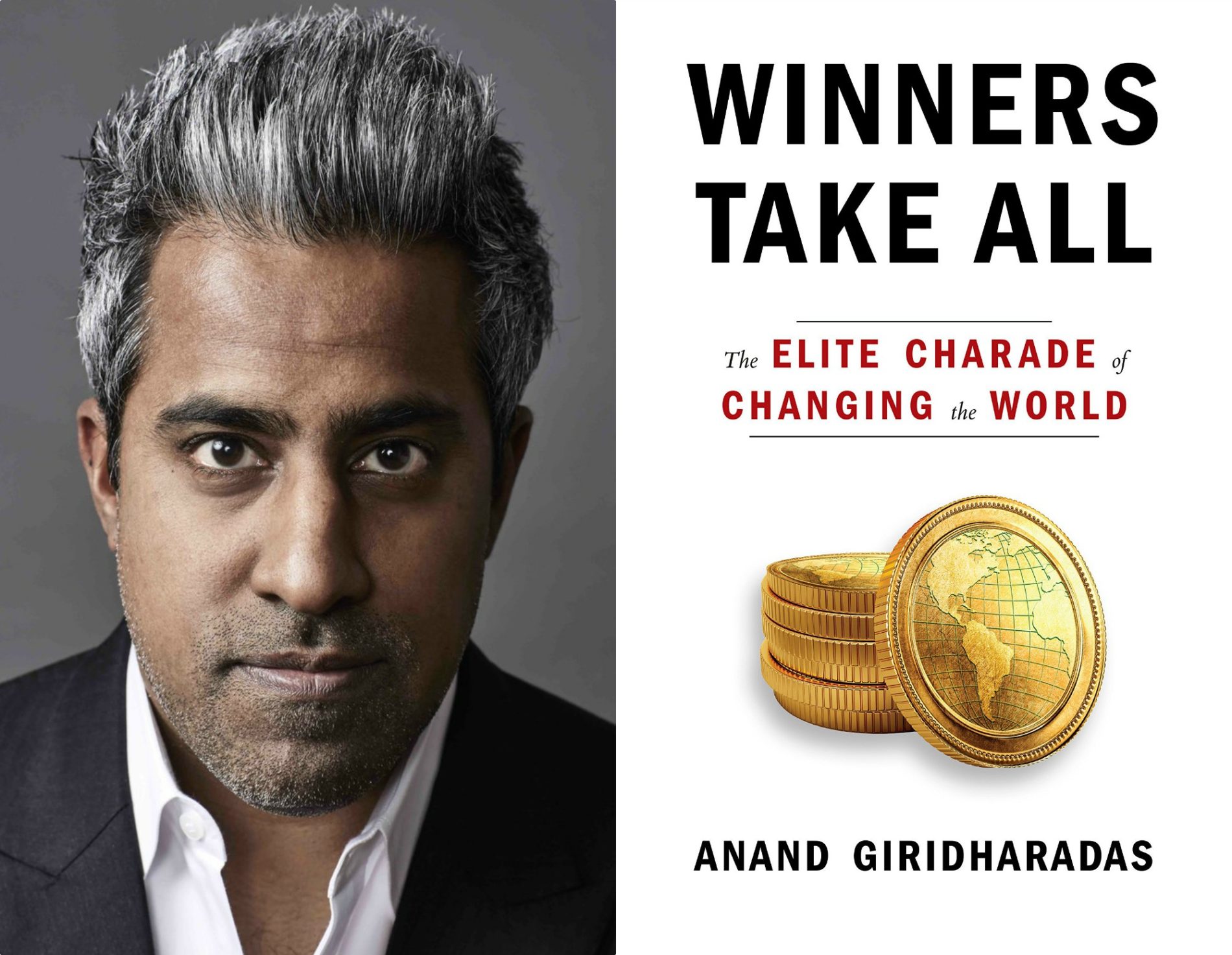My latest article on Impakter, here’s the opening:

Looking back to the exceptional crop of 2018 bestsellers criticizing the state of our society, from rising economic inequality to populism and climate change, one book stands out: “Winners Take All” by former New York Times columnist and Aspen Institute fellow Anand Giridharadas. It skewers philanthrocapitalism, arguing that uber wealthy do-gooders, rather than changing the world, do well for themselves, preserving the status quo. What is needed is a move to more responsible giving.

Book cover and author photo by Mackenzie Stroh
Anand Giridharadas made waves with his new book, Winners Take All, The Elite Charade of Changing the World and the waves show no sign of stopping.
When it came out in August 2018, the renowned American economist and Nobel laureate John Stiglitz, in praising it in a New York Times article warned that we should “prepare for a new genre” of books analyzing economic inequality and globalization: the kind that “gently and politely skewer[s] the corporate titans who claim to be solving such problems. It’s an elite that, rather than pushing for systemic change, only reinforces our lopsided economic reality — all while hobnobbing on the conference circuit and trafficking in platitudes.”
Since then, Anand Giridharadas has been active on the conference circuit but he has certainly not been “trafficking in platitudes” and he has stopped being gentle and polite. Instead, he has taken to “skewering corporate titans” with a vengeance, even going into their lairs, as he did when he gave this talk at Google in October 2018:
In December 2018, The Financial Times, in a lengthy article titled “Is wealthy philanthropy doing more harm than good?”, reviewed Anand Giridharadas’ book along with two others that touch on the subject: Just Giving, Why Philanthropy is Failing Democracy and How it Can Do Better by Stanford University scholar Rob Reich and Trumponomics: Inside the America First Plan to Revive Our Economy by Stephen Moore and Arthur B Laffer, Trump’s campaign economic advisers.
For the FT, Trumponomics was a “timely defence of the president’s policies” and in particular of his €1.5 trillion tax cut – and it predicted that, of the three books, this was the one most likely to become a bestseller “given the size of the conservative bulk book market” in the United States.
The prediction turned out to be wrong: Of the three, as of now, Giridharadas’ book is clearly the best seller, ranking highest on Amazon’s best sellers list (#252 and #1 for the philanthropy category), followed by Reich (#27,928) and far behind, Trumponomics (#85,183).
Perhaps many, if not most, American readers are tired of Trump.
The FT however does make an important point: What’s wrong with philanthropism in America is that the US has a uniquely favorable tax system that allows all kinds of charities to deduct taxes “regardless of whether they are effective”. Annual tax breaks amount to $50 billion, as much as the Federal government spends on energy, the environment, food and agriculture. Reich calculates that barely 20 percent of philanthropy benefits the poor, the rest mostly goes to education, culture (the arts) and religion (worship).
The FT draws attention to an important point made by both Giridharadas and Reich: Giving to education is problematic. It benefits wealthy district schools or charter schools, thus increasing American public education’s “savage inequality”. The FT clearly enjoys Giridharadas’ sense of “acute observation” and polemical tone, quoting him on Trump (though leaving out the last five words in the sentence):
By January 2019, as political leaders and corporate titans were flying to the World Economic Forum in Davos, Giridhadarads raised the tone. The press rushed to cover him. The Economist called it an “entertaining polemic”, subtitling its book review “The Davos Delusion”.
“Trump is the reductio ad absurdum of a culture that tasks elites with reforming the very systems that have made them and left others in the dust.”
On Bloomberg, Giridharadas baffled his interviewers, lashing out at Davos, calling it “a family reunion of the people who broke the world” and suggesting Davos should be cancelled:
…
The rest on Impakter (including the Bloomberg video), click here to read.


